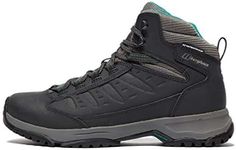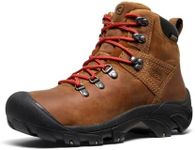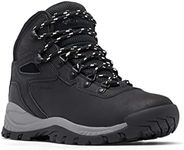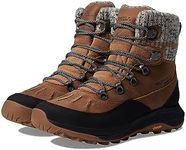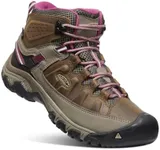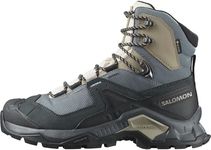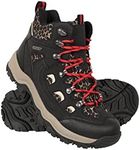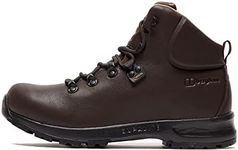Buying Guide for the Best Womens Hiking Boots
Choosing the right pair of women's hiking boots is crucial for comfort, safety, and performance on the trails. The right boots will provide the necessary support and protection for your feet, allowing you to enjoy your hiking adventures without discomfort or injury. When selecting hiking boots, consider the type of terrain you'll be hiking on, the climate, and the duration of your hikes. It's important to try on different styles and sizes to find the best fit for your feet, as a good fit can prevent blisters and other foot issues.FitThe fit of a hiking boot is perhaps the most important factor to consider. A well-fitting boot should feel snug around the heel and midfoot, with enough room in the toe box to wiggle your toes. This is important because a good fit prevents blisters and provides stability on uneven terrain. When trying on boots, wear the socks you plan to hike in and walk around to ensure there are no pressure points or slipping. If you plan on hiking long distances or carrying a heavy pack, consider a slightly larger size to accommodate foot swelling.
MaterialHiking boots are made from a variety of materials, each offering different levels of durability, breathability, and water resistance. Leather boots are durable and offer good water resistance, making them ideal for rugged terrain and wet conditions. Synthetic materials like nylon and polyester are lighter and more breathable, suitable for warm weather hiking. Consider the climate and terrain you'll be hiking in when choosing the material. If you expect wet conditions, opt for waterproof materials or boots with a waterproof membrane.
Support and StabilitySupport and stability are crucial for preventing injuries on the trail. Hiking boots come with varying levels of ankle support, from low-cut to high-cut designs. High-cut boots offer more ankle support and are ideal for rough terrain or when carrying a heavy backpack. Mid-cut boots provide a balance of support and flexibility, suitable for moderate trails. Low-cut boots are lighter and more flexible, best for well-maintained trails. Choose the level of support based on the type of hiking you plan to do and your personal preference for ankle stability.
TractionTraction refers to the grip the sole of the boot provides on different surfaces. Good traction is essential for maintaining stability on slippery or uneven terrain. Hiking boots typically have lug patterns on the soles that provide grip. Deep, aggressive lugs are better for muddy or loose terrain, while shallower lugs are suitable for rocky or hard-packed trails. Consider the types of surfaces you'll encounter most often and choose a boot with a sole that offers the appropriate level of traction.
WeightThe weight of a hiking boot can affect your comfort and endurance on the trail. Heavier boots offer more support and protection but can be tiring over long distances. Lighter boots are more comfortable for long hikes and allow for greater agility, but may offer less protection. Consider the length and difficulty of your hikes when choosing the weight of your boots. For long-distance or multi-day hikes, a lighter boot may be preferable, while for short, rugged hikes, a heavier boot might be more suitable.
WaterproofingWaterproofing is an important feature if you plan to hike in wet conditions or cross streams. Waterproof boots have a membrane or coating that prevents water from entering while allowing moisture to escape, keeping your feet dry. However, waterproof boots can be less breathable, which might be uncomfortable in hot weather. If you frequently hike in wet environments, waterproof boots are a good choice. For dry climates, you might prioritize breathability over waterproofing.
